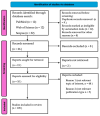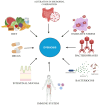The Impact of Antibiotic Therapy on Intestinal Microbiota: Dysbiosis, Antibiotic Resistance, and Restoration Strategies
- PMID: 40298495
- PMCID: PMC12024230
- DOI: 10.3390/antibiotics14040371
The Impact of Antibiotic Therapy on Intestinal Microbiota: Dysbiosis, Antibiotic Resistance, and Restoration Strategies
Abstract
The human gut microbiota-an intricate and dynamic ecosystem-plays a pivotal role in metabolic regulation, immune modulation, and the maintenance of intestinal barrier integrity. Although antibiotic therapy is indispensable for managing bacterial infections, it profoundly disrupts gut microbial communities. Such dysbiosis is typified by diminished diversity and shifts in community structure, especially among beneficial bacterial genera (e.g., Bifidobacterium and Eubacterium), and fosters antibiotic-resistant strains and the horizontal transfer of resistance genes. These alterations compromise colonization resistance, increase intestinal permeability, and amplify susceptibility to opportunistic pathogens like Clostridioides difficile. Beyond gastrointestinal disorders, emerging evidence associates dysbiosis with systemic conditions, including chronic inflammation, metabolic syndrome, and neurodegenerative diseases, underscoring the relevance of the microbiota-gut-brain axis. The recovery of pre-existing gut communities post-antibiotic therapy is highly variable, influenced by drug spectrum, dosage, and treatment duration. Innovative interventions-such as fecal microbiota transplantation (FMT), probiotics, synbiotics, and precision microbiome therapeutics-have shown promise in counteracting dysbiosis and mitigating its adverse effects. These therapies align closely with antibiotic stewardship programs aimed at minimizing unnecessary antibiotic use to preserve microbial diversity and curtail the spread of multidrug-resistant organisms. This review emphasizes the pressing need for microbiota-centered strategies to optimize antibiotic administration, promote long-term health resilience, and alleviate the disease burden associated with antibiotic-induced dysbiosis.
Keywords: antibiotic resistance; dysbiosis; fecal microbiota transplantation; gut microbiota; microbial diversity; prebiotics and synbiotics; probiotics.
Conflict of interest statement
The authors declare no conflicts of interest.
Figures


Similar articles
-
The role of the gut microbiome in colonization resistance and recurrent Clostridioides difficile infection.Therap Adv Gastroenterol. 2022 Nov 18;15:17562848221134396. doi: 10.1177/17562848221134396. eCollection 2022. Therap Adv Gastroenterol. 2022. PMID: 36425405 Free PMC article. Review.
-
Antibiotic-Therapy-Induced Gut Dysbiosis Affecting Gut Microbiota-Brain Axis and Cognition: Restoration by Intake of Probiotics and Synbiotics.Int J Mol Sci. 2023 Feb 4;24(4):3074. doi: 10.3390/ijms24043074. Int J Mol Sci. 2023. PMID: 36834485 Free PMC article. Review.
-
Exploring the role of gut microbiota in antibiotic resistance and prevention.Ann Med. 2025 Dec;57(1):2478317. doi: 10.1080/07853890.2025.2478317. Epub 2025 Mar 17. Ann Med. 2025. PMID: 40096354 Free PMC article. Review.
-
Therapeutic interventions for gut dysbiosis and related disorders in the elderly: antibiotics, probiotics or faecal microbiota transplantation?Benef Microbes. 2017 Apr 26;8(2):179-192. doi: 10.3920/BM2016.0115. Epub 2016 Dec 23. Benef Microbes. 2017. PMID: 28008784 Review.
-
Antibiotic-induced gut dysbiosis and barrier disruption and the potential protective strategies.Crit Rev Food Sci Nutr. 2022;62(6):1427-1452. doi: 10.1080/10408398.2020.1843396. Epub 2020 Nov 16. Crit Rev Food Sci Nutr. 2022. PMID: 33198506 Review.
Cited by
-
The Changing Landscape of Antibiotic Treatment: Reevaluating Treatment Length in the Age of New Agents.Antibiotics (Basel). 2025 Jul 20;14(7):727. doi: 10.3390/antibiotics14070727. Antibiotics (Basel). 2025. PMID: 40724028 Free PMC article. Review.
-
The metabolome of fecal extracellular vesicles in patients with malignant solid tumors.Sci Rep. 2025 Aug 11;15(1):29402. doi: 10.1038/s41598-025-14250-2. Sci Rep. 2025. PMID: 40789885 Free PMC article.
References
-
- Vicentini F.A., Keenan C.M., Wallace L.E., Woods C., Cavin J.P., Flockton A.R., Macklin W.B., Belkind-Gerson J., Hirota S.A., Sharkey K.A. Intestinal microbiota shapes gut physiology and regulates enteric neurons and glia. Microbiome. 2021;9:210. doi: 10.1186/s40168-021-01165-z. - DOI - PMC - PubMed
Publication types
LinkOut - more resources
Full Text Sources

